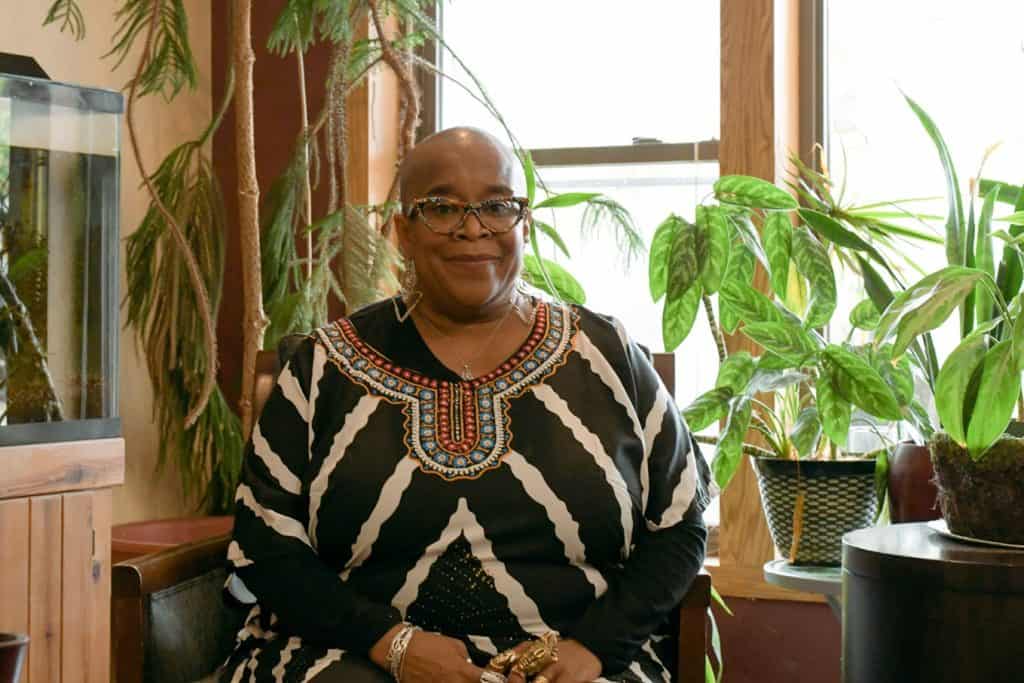Voices of Hennepin Healthcare: Akhmiri Sekhr-Ra

The Chief Family Development Officer at the Cultural Wellness Center shares her harmonious vision for wellness – and why we need the community to enjoy health.
“I can count on one hand how many jobs I’ve had,” says Akhmiri Sekhr-Ra with pride. “My mother worked at the same place until she retired. I’m doing the same at the Cultural Wellness Center. This is my retirement plan; I’m not going anywhere else.”
Akhmiri is now the Chief Family Development Officer at the Cultural Wellness Center in Minneapolis, an organization with strong, longstanding ties to Hennepin Healthcare. She became involved with the Center in 1996 as a community member, was asked to join the Board and then became a community partner. She came on staff 15 years ago.
“You have to do what your heart tells you to. For me, this is much more than a job,” she explains. “I work with individuals and groups to help them connect with their cultural heritage. Isolation and loss of community make you sick. I work to improve the health of our families and babies. I help people connect to their culture so they can keep it for their children.”
Her days include supporting growing families as a doula (a trained companion and advocate who helps parents and families throughout pregnancy and birth), training other doulas, and teaching at birth centers. She works with clients throughout the world: public school systems, city councils, Hennepin Healthcare’s Redleaf Center for Family Healing, and more.
Change Is Possible
As Hennepin Healthcare pursues a planning process to advance health equity within the system and entire community, Akhmiri shares her vision for how healthcare can strengthen community health, healing, and connection.
When considering Hennepin Healthcare’s current planning process, Akhmiri takes a deep breath and says that the initiative must begin by truly believing that change is possible. “This is about really listening to others and not checking a box or doing a survey just to do it,” she says.
“They [Hennepin Healthcare] have to believe that a change is possible. I believe that it is possible. When we don’t believe this, it’s not helping anything, not teaching our children anything.”
Moving From Race to Culture
One of the guiding principles at the Cultural Wellness Center is “moving from race to culture,” which is also a popular course and a decades-old concept that is now receiving an exciting level of national and global attention.
“This is more than a slogan. We believe that race is a construct,” says Akhmiri, “and that thinking about your cultural background and things that your people used to do to keep them grounded and prevent them from being isolated; helps you find the people that you need in life to be healthy and connected. That’s our work and everything that we do is trying to answer the question about: what is culture and who are your people that you depend on?”
“Today, people are more isolated,” she continues. “You can’t go through life alone, you have to have someone. You can do this through your culture. We believe people are capable of healing themselves. People need others to listen and support them throughout their healing. I love helping others through my one-on-one work.”
As Hennepin Healthcare creates a plan to build a more equitable and responsive system, Akhmiri sees this as an opportunity to invest in training and education about cultural backgrounds, practices, modes for healing, family structures, and communities — as well as resources and programs for individual, family and community well-being.
Dreams for Hennepin Healthcare, Rooted in Simplicity
Akhmiri hopes that Hennepin Healthcare’s planning process will amplify, accelerate, and expand the remarkable work already happening. “I’m working with the Redleaf Center,” she explains, “to start a doula collaborative; this will have a very different kind of feel. Here, we are supporting the families and surrounding them with non-judgmental support from the baby’s conception to five years of age.”
She also points out that while many aspects of healthcare are complex, we can choose to focus on simple truths. She recommends improving providers’ understanding of cultural wellness — as well as improving the relationships between the provider, patient and community — to promote healthcare that supports patients of all cultures and a sense of connection that we need to feel cared for and heard.
“It’s the providers that know your name and welcome you, know your family because they’ve met everyone and listened to your stories. They support you, follow up and follow through — and nobody thinks that they are bigger than anybody else,” Akhmiri concludes. “That is the type of system that I want to see.”
Learn more about the planning process and sign up for monthly updates from Jennifer DeCubellis, CEO at HennepinHealthcare.org/ourfuture
1 Comments
Leave a Comment
You must be logged in to post a comment.


Wow, this was moving to read.
I believe these concepts will be transformative for everyone involved.
Patients to providers, providers to patients, to communities etc.
Thank you for sharing!